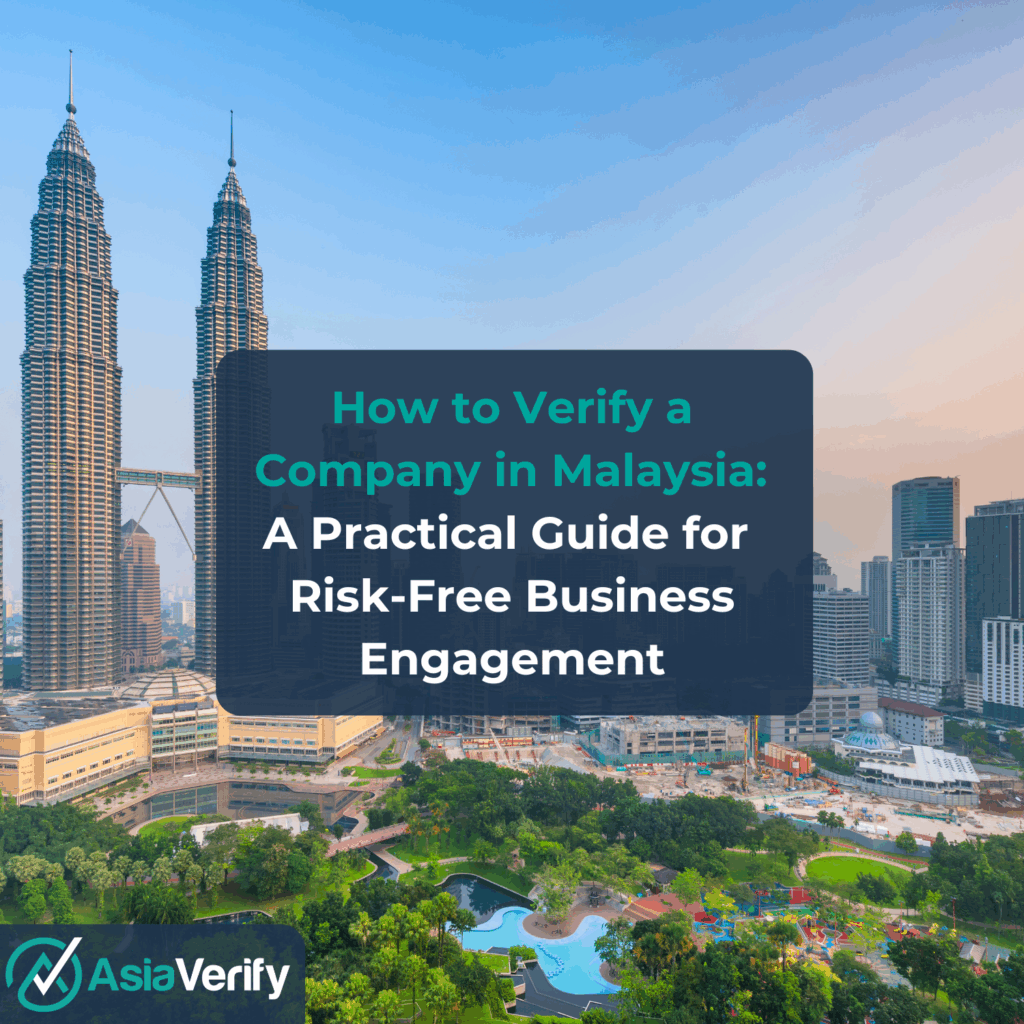Follow this guide to run reliable KYB and UBO checks on Malaysian companies using official data

Verifying a business’ legitimacy is no longer solely the responsibility of compliance officers or large institutions. Whether you are entering into a partnership, assessing a supplier, or onboarding a vendor, it is essential to ensure that a company is properly registered and operating legally in Malaysia.
This guide outlines how to verify a Malaysian company using official tools and data. We also highlight the most common mistakes to avoid and discuss how technology can streamline this process, particularly when accuracy and speed are essential.
Why it’s crucial to verify a company in Malaysia
All businesses in Malaysia must register with the Companies Commission of Malaysia (SSM), also known as Suruhanjaya Syarikat Malaysia. This includes private limited companies (Sdn Bhd), sole proprietorships, partnerships, and limited liability partnerships (LLPs). The registration number issued by SSM serves as a unique identifier and confirms the company’s recognition under Malaysian law.
Verifying a company safeguards you against fraud, ensures regulatory compliance, and uncovers vital information such as whether a company is active, who owns or manages it, and whether it has fulfilled its legal obligations.
If you`re wondering how to verify a company in Malaysia, the following step-by-step guide will walk you through the process using official platforms and tools provided by SSM.
Step 1: Understand the Malaysian company registration number
Every registered business in Malaysia is assigned a 12-digit registration number, which was introduced as part of a nationwide standardisation initiative in 2019. This number is organised so that the first four digits represent the year of registration, the following two digits indicate the type of business entity – ‘01’ for locally Sdn Bhd, ‘02’ for foreign companies, ‘03’ for businesses (Sole Proprietorship or Partnership), ‘04’ for local Limited Liability Partnerships (LLPs), ‘05’ for foreign LLPs, and ‘06’ for professional services LLPs. The final six digits serve as a unique serial number.
This number is crucial for all official dealings and serves as the simplest method to check a company’s status in real time.
Step 2: Use official sources to verify registration
The most reliable method to verify a company’s existence and status is through the SSM e-Info or MyDATA-SSM portals. These are official platforms authorised by the government to provide corporate data.
To verify a company, visit one of the portals above and input the company name or registration number. You can then view essential details such as the registered name, company number, date of incorporation, type of entity, and current status, which may be categorised as active, wound up, or struck off.
This basic search confirms whether a company exists and is legally registered.
Step 3: Request the official company profile
A basic search may not be adequate for due diligence or regulatory compliance. For this reason, you may need a Company Profile Report, which can be obtained for a nominal fee from either e-Info or MyDATA-SSM.
This document contains a comprehensive list of directors and shareholders, the registered address, the nature of business activities, company status and history, as well as an indication of whether the company is current with its filings.
It is also useful for reviewing potential red flags, such as frequent director changes, dormant status, or incomplete filings.
It is also highly useful for identifying potential red flags, such as frequent director changes, dormant status, or incomplete statutory filings.
If you`re conducting business in other ASEAN countries like Thailand, a similar approach applies. You can perform a KYB business verification in Thailand via the Department of Business Development (DBD), which allows you to verify company information and access official corporate records.
Step 4: Look beyond registration and check ownership and risk
It’s not solely about registration; you also need to understand who runs the business and whether they pose any potential risk.
Malaysia has introduced Ultimate Beneficial Ownership (UBO) disclosure requirements; however, accessing this information from public sources can be challenging. This is where digital platforms like AsiaVerify can help by providing real-time data on directors and shareholders, UBO mapping, sanctions and litigation screening, along with translated records where applicable.
This enables you to swiftly ascertain whether a company is associated with politically exposed persons (PEPs), sanctioned individuals, or ongoing legal proceedings.
Step 5: Confirm the company’s online and operational presence
Although not a formal requirement, verifying a company’s online presence can offer valuable context. Visit the company’s official website and cross-check its contact details with the information listed on SSM. Look for indicators of professional operations, including a company email domain, a business address, and listings in local directories.
You may also seek independent reviews or news articles that help to validate the company’s track record. For online businesses, it might be worthwhile to check if the company has earned a BizTrust certification, which recognises those that meet specific standards in transparency, data protection, and ethical practices.
What it means if you can’t verify a company in the registry
If a business name or number does not appear in the SSM records, it may be unregistered, struck off, dissolved, or registered under a different legal name. In such cases, you should refrain from proceeding until the business provides valid supporting documentation and the information has been verified through official channels.
How AsiaVerify streamlines the verification process
Although SSM portals are publicly accessible, manually verifying businesses can be time-consuming. This is particularly true when reviewing multiple entities or requiring detailed insights swiftly.
AsiaVerify streamlines the process by connecting directly to SSM for live data retrieval. It offers comprehensive company profiles, ownership structures, and real-time risk screening within a single dashboard. It also facilitates bulk verification and automation, which is especially beneficial for organisations with high-volume due diligence or onboarding needs.
By integrating official registry information with compliance checks and accessible reporting, AsiaVerify facilitates quicker, more dependable business decisions.
A culture of caution is good business practice
Verifying a business in Malaysia goes beyond mere compliance; it plays a crucial role in safeguarding your organisation against fraud, untrustworthy partnerships, and reputational risk.
Using official sources and understanding the complete picture of a company’s structure and status enables you to make informed decisions with confidence. Whether onboarding a supplier or contemplating a strategic partnership, these verification steps provide a robust foundation for secure and sustainable business relationships.
If you’re looking for a faster and more reliable way to verify Malaysian businesses using real-time government data, AsiaVerify is here to help.
Book a demo to discover how our platform can assist your compliance, risk, and onboarding processes throughout Asia.
Book a 15-min demo and see how AsiaVerify accelerates onboarding, reduces false positives, and keeps you audit-ready.








